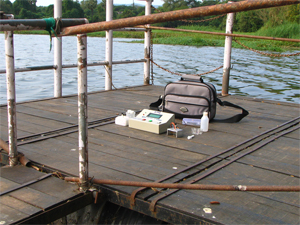 A
vast majority of our population does not have access to
safe drinking water and this has a significant bearing on their
health. In rural areas drinking water is largely obtained from
natural sources and these water sources are getting increasingly
polluted due to heavy use of fertilizers or excessive
drawing of ground-water resulting in high levels of nitrates,
fluorides, arsenic or iron. At present, the purity of water
can
only be tested in laboratories using expensive equipment and
highly trained technicians or with chemical test kits of poor
reliability. The development of a polysensor aims at providing
a low-cost and simple system of testing for impurities in
water that can be used by a lay person with a little training.
A
vast majority of our population does not have access to
safe drinking water and this has a significant bearing on their
health. In rural areas drinking water is largely obtained from
natural sources and these water sources are getting increasingly
polluted due to heavy use of fertilizers or excessive
drawing of ground-water resulting in high levels of nitrates,
fluorides, arsenic or iron. At present, the purity of water
can
only be tested in laboratories using expensive equipment and
highly trained technicians or with chemical test kits of poor
reliability. The development of a polysensor aims at providing
a low-cost and simple system of testing for impurities in
water that can be used by a lay person with a little training.
The system consists of a set of electrochemical
sensors
and an electronic measuring instrument. The sensors are specific-
ion electrodes with potentiometry as the measurement
principle. The instrument is battery-operated and portable
for
field use. The measured contaminant levels are compared
with those specified by WHO with a green/red LED lighting
up indicating that the sample is potable/non-potable. For
a
detailed report, there is a 20 char × 4 line LCD display
that
reads out the measured concentrations. The sensor-cartridge
is screen-printed, low-cost and can be easily replaced.
The instrument is currently capable of testing
for electrical
conductance, total dissolved solids, salinity, pH, chloride
and nitrate. Sensors for fluoride, iron and mercury have
been developed while sensors for arsenic and microbial
contamination are being developed. With some modifications,
the system will be suitable for testing for soil condition
and
adulteration of milk. It is proposed to develop a system
for
health-care diagnostics based on biosensors that have been
created in IIT Bombay labs over the past fifteen years.